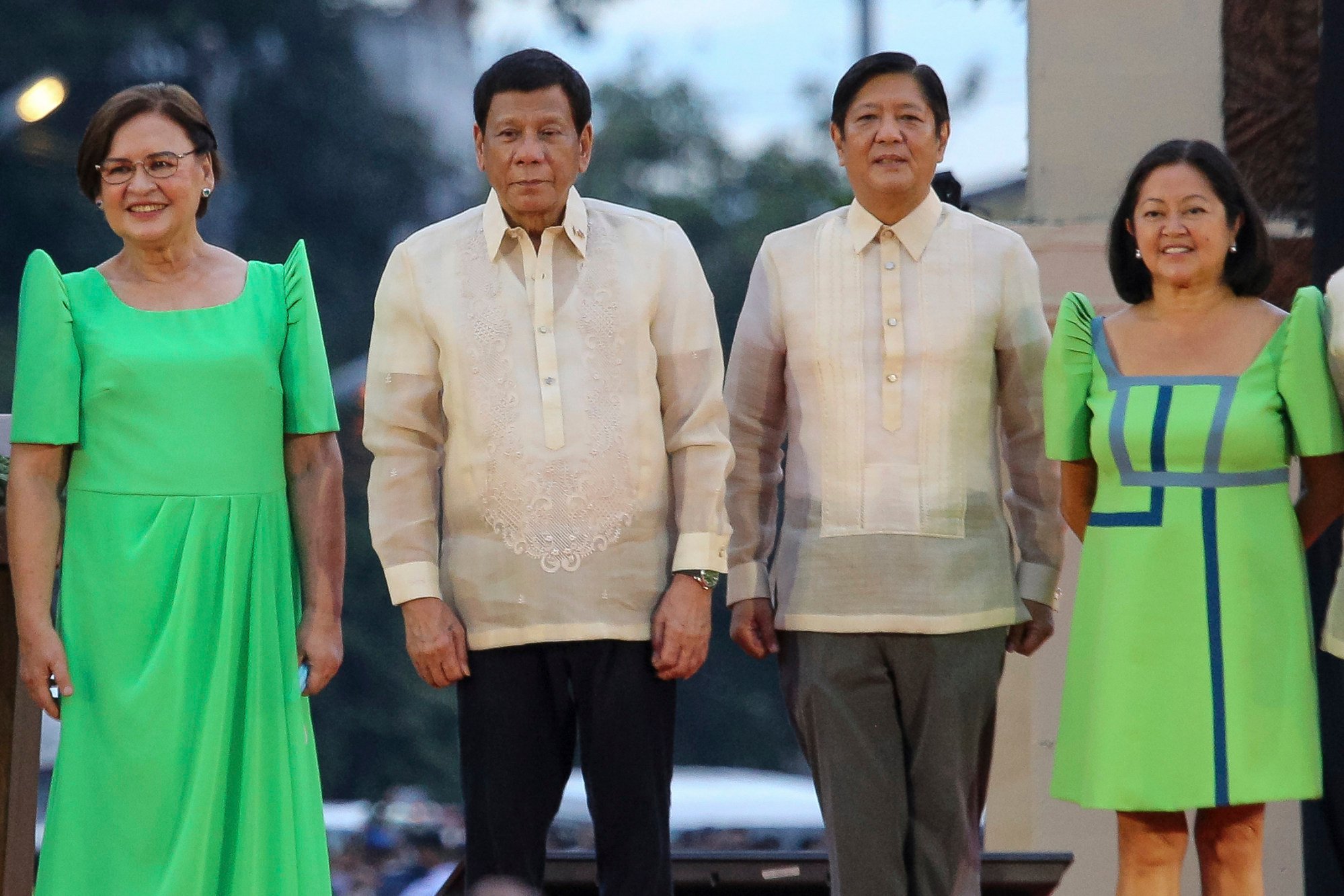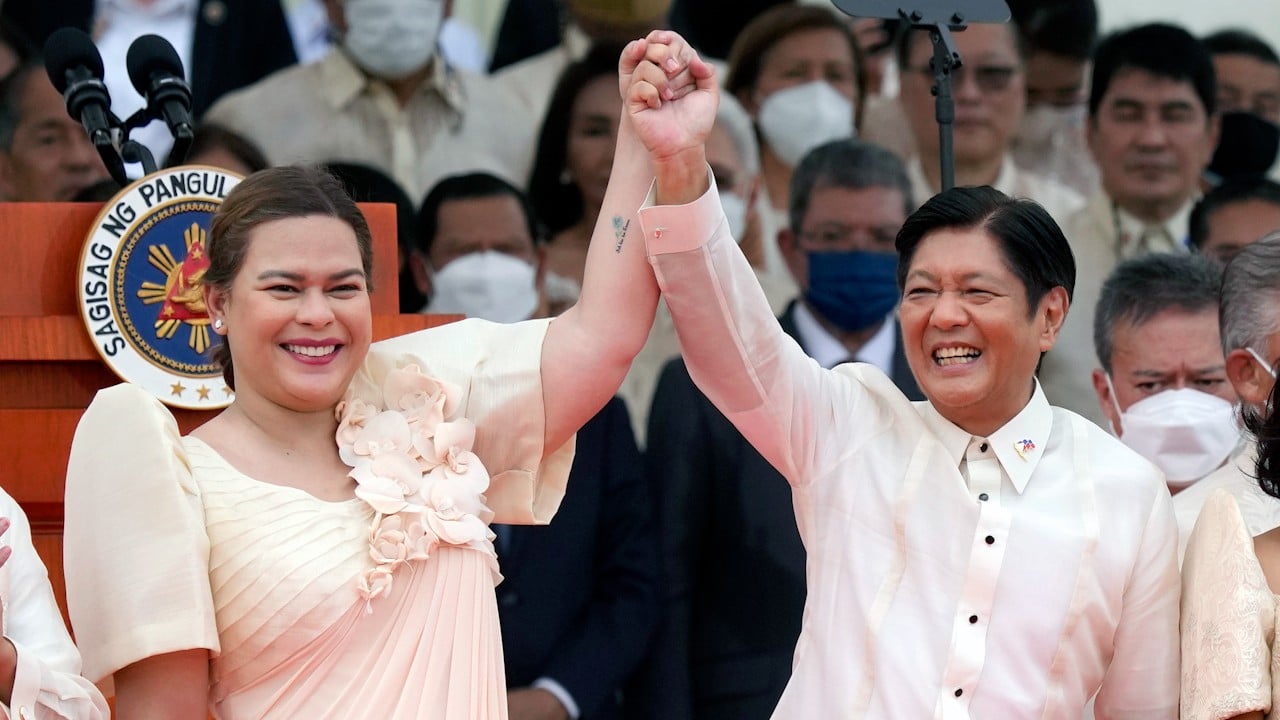Marcos Jnr supporters gloat on their own pages about how Duterte will soon be arrested and hauled off to the International Criminal Court in The Hague, to be tried and sentenced for crimes against humanity. In the comments, a Marcos loyalist calls Duterte “Mang Kanor” – a coarse nickname given to an old man who allegedly starred in a sex video with a young girl.
Philippines’ ‘warning sign’ as political insults may lead to ‘civil war’
Philippines’ ‘warning sign’ as political insults may lead to ‘civil war’
It’s a far cry from 2022, when supporters from both sides worked together to support the election campaign of Marcos Jnr and his vice-presidential running mate, Duterte’s daughter Sara. Marcos Jnr and Sara had initially both vied for the presidency but later agreed to form a “uniteam” with Marcos Jnr running for the top spot and Sara switching to vice-president.
But ties between Marcos Jnr and the Dutertes deteriorated after he won the presidency.
When she became vice-president in 2022, Sara asked for the position of defence secretary. She was denied that and given the education minister role instead. She also demanded a “confidential” fund of 250 million pesos (US$4.4 million) but received half of the amount.
Last year, she alluded to a key Marcos relative as a tambaloslos – a Visayan insult referring to a mythical tiny demon-like creature with a huge mouth and prominent genitals. The elder Duterte later weighed in with charges that Marcos Jnr was a drug addict.
Despite occasional public assurances from both sides that all’s well between the two families, the alliance unravelled. Rossine Fallorina, managing director of Sigla Action Research Centre for Resilient Public, was surprised by the speed of the break-up.
Fallorina, who has studied political trolls and disinformation networks since 2018, told This Week in Asia: “Most of us [expected] the uniteam tandem would break down, but no one expected it to be this quick, with both sides going against each other as early as the first year of the Marcos administration.”
Asked if trolls had become an indispensable weapon for Philippine politicians, Fallorina said: “Very much so. In our past research we found out that politicians used troll farms to win elections initially at the national level and 1709179384 down to the local level.”
He said his group had found that, over the years, “disinformation has diversified into influence operations, a more encompassing term that includes content not blatantly false, became more entrenched in political campaigns, and has involved a diverse set of actors”.
Philippine ex-policeman accuses Duterte’s children of planning drug killings
Philippine ex-policeman accuses Duterte’s children of planning drug killings
A University of Oxford study in 2017 said Duterte spent US$200,000 on trolls during his campaign, and he has admitted to paying users on social media.
Other studies have since shown that there is little that is authentic or spontaneous about the behaviour of online trolls deployed by politicians. They are paid for, organised in groups, given assignments, and egged on by “influencers”.
Rodrigo Duterte appointed several online trolls to government positions, including then-foreign secretary Teodoro Locsin Jnr, who had even defended a comparison of his boss with Adolf Hitler.
When Marcos Jnr won the presidency in 2022, he appointed a lawyer disbarred by the Supreme Court for an outburst in a video, to a cabinet position. But he largely ignored many supporters who had fought his online battles.
His wife may be the reason for that, Fallorina said. “Vloggers say [First Lady] Liza Marcos was insecure whether she had the backing of some vloggers who were more supportive of the Dutertes, so she started the purge and became selective of whom to support,” he said.

Most of these major influencers have jumped ship to Duterte’s camp and are “likely still being mobilised as part of a large disinformation campaign”, Fallorina said.
He pointed out that online trolls have no loyalty. “I don’t think we can expect political allegiances from vloggers, in the same way that we don’t expect it from politicians.”
Pro-Marcos trolls are largely playing defence, Fallorina said. “They don’t engage [Duterte] trolls head on but would rather talk about issues and allegations if they’re reported by mainstream media. They try to promote positive messages instead of amplifying heated issues.”
Fallorina does not see the online war concluding. “I don’t think it will end any time soon. Some vloggers are able to monetise this feud, so there’s no incentive to stop.”


